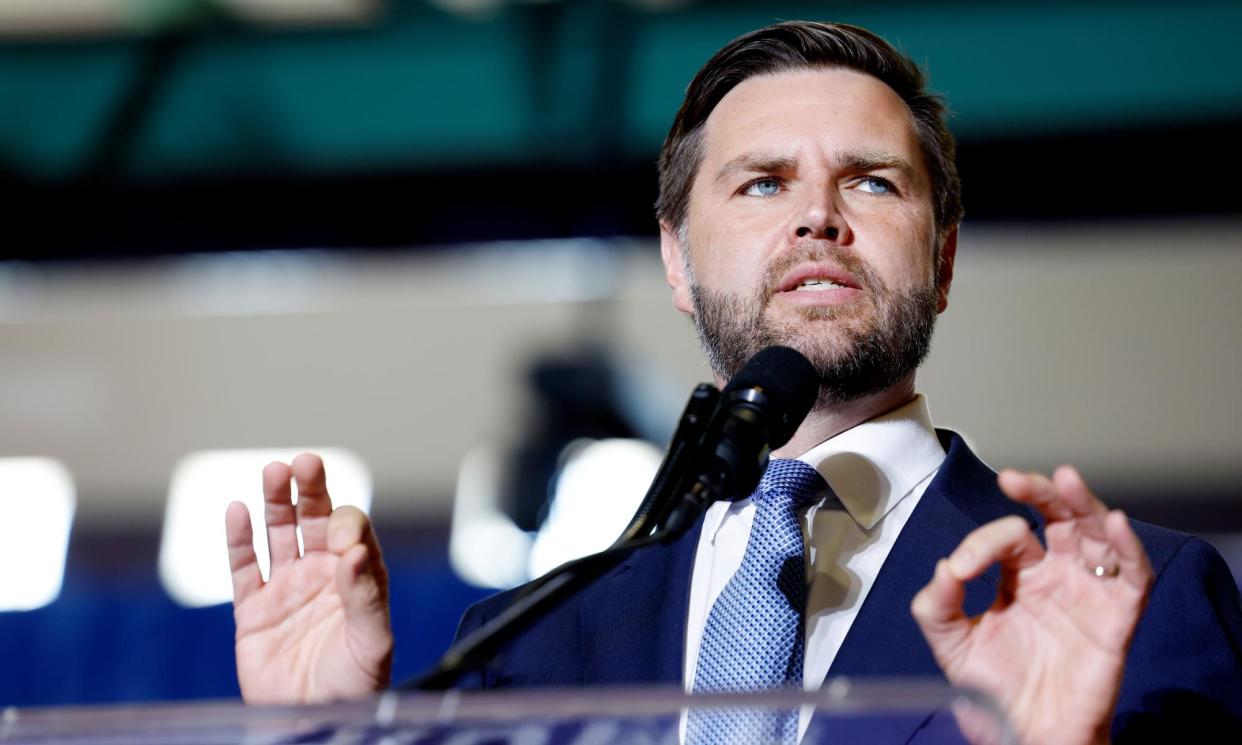JD Vance Writes Glowing Foreword to Project 2025 Leader’s Upcoming Book
In a significant boost for Project 2025, JD Vance, the Republican vice-presidential nominee, has penned a foreword for the upcoming book by Kevin Roberts, president of the Heritage Foundation and pivotal figure behind Project 2025. This collaboration highlights a shared ideological journey, as Vance lauds Roberts’ vision as a “fundamentally Christian view of culture and economics” and presents an ambitious, if unorthodox, roadmap for conservatives in today’s political landscape.
The foreword was publicly disclosed by The New Republic on Tuesday, drawing considerable attention as it encapsulates the personal and political parallels between Vance and Roberts. Both leaders share humble beginnings, having been raised in economically challenged regions often overlooked by the political elite—Vance in Ohio and Kentucky, and Roberts in Louisiana. Their backgrounds have imparted a valuable perspective on the socio-economic challenges faced by many Americans. Moreover, both are practicing Catholics, with Vance converting in his adult life, illustrating their commitment to a shared moral framework.
Vance’s reflections in the foreword not only focus on their similar upbringings but also align their visions for a better America. He praises Roberts for his tenacity in using his influential position at the Heritage Foundation to propose radical ideas rather than opting for a conventional, risk-averse approach. As Vance asserts, the Foundation has historically served as a bedrock of conservative thought, catalyzing ideas from the Reagan era through to Donald Trump. He celebrates Roberts for recognizing that merely maintaining the status quo could lead to dire consequences for the nation, affirming the need for a more vigorous and novel conservative agenda.
Although there has been an apparent attempt by the Trump campaign to create distance from Project 2025—especially given its unpopularity among essential voter demographics—Vance's enthusiastic endorsement adds complexity to that narrative. Vance’s endorsement signifies a stronger alignment between Trump and Roberts’ ambitious policies, potentially challenging efforts to dilute their influence.
Adding to the intrigue surrounding Project 2025, Paul Dans, the project’s director, announced his resignation just hours before the foreword's publication, signaling possible shifts within the project's leadership and strategy. Nonetheless, Roberts reassured stakeholders that the collective efforts to equip conservatives with a robust “personnel apparatus” for a prospective second Trump term will persist.
Amidst a backdrop of heightened scrutiny, especially regarding Roberts' recent comments describing the US as entering a "second American revolution," Vance defends his colleague’s contributions to the conservative conversation. Roberts’ ties to the Catholic organization Opus Dei and his controversial views on birth control have also drawn criticism. However, Vance has previously acknowledged Roberts as a valuable advisor whose insights have helped re-imagine the Heritage Foundation’s role in contemporary politics.
In the foreword, Vance emphasizes Roberts’ clarity on two pressing issues: regulating the oversized influence of major tech companies and promoting a Christian ethos toward family values. He resonates particularly with Roberts’ claim that the current social environment demands scrutiny of technological giants like Apple and Google, which have attained unprecedented clout and involvement in public discourse. Vance underscores that “the stakes couldn’t be higher,” suggesting that these corporations’ capacities to infringe upon freedom of speech necessitate a more assertive response from conservatives.
Vance further advocates for fostering positive cultural norms, espousing the idea that marriage should be viewed not merely as a contractual agreement but as a sacred union. He calls for a renewed commitment to encouraging familial stability and addressing affordability concerns that hinder young people from pursuing homeownership or establishing families.
He writes, “We should encourage our kids to get married and have kids. We should teach them that marriage isn’t just a contract but a sacred – and to the extent possible, lifelong – union.” At its core, this vision necessitates that conservatives advocate for policies that enable families from all economic backgrounds to thrive, ensuring that parental stability is not a privilege solely reserved for the affluent.
To realize this vision, Vance contends that conservatives must take an offensive stance, moving beyond mere dismantling of unfavorable policies to actively rebuilding the social fabric. He invokes the imagery of a “second American Revolution” as a clarion call for proactive engagement, stating, “It’s fine to take a laissez-faire approach when you are in the safety of the sunshine. But when the twilight descends and you hear the wolves, you’ve got to circle the wagons and load the muskets.”
In conclusion, Vance's foreword embodies a rallying cry for a reimagined conservative agenda. By syncing the hopes of his narrative with those of Kevin Roberts, Vance articulates a vision of an America prepared to grapple with its challenges through a fierce commitment to cultural values rooted in Christian principles. It is a call to action for conservatives to embrace a renewed sense of urgency, strategizing not just for resistance but for a comprehensive rebuilding of American ideals and institutions. As the political landscape evolves, the implications of Vance's reflections could resonate far beyond their immediate context, potentially redefining the future dialogue within the Republican Party and its supporters.
